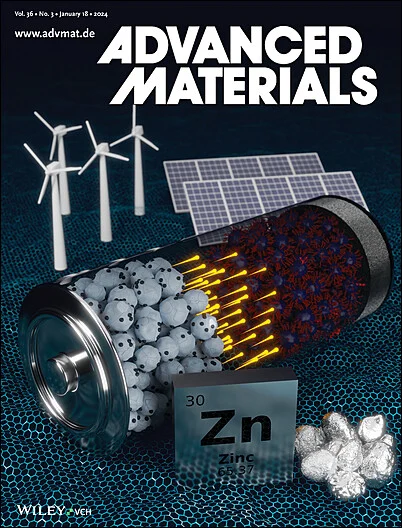Legumain In Situ Engineering Promotes Efferocytosis of CAR Macrophage to Treat Cardiac Fibrosis
IF 27.4
1区 材料科学
Q1 CHEMISTRY, MULTIDISCIPLINARY
引用次数: 0
Abstract
Uncontrolled and excessive cardiac fibrosis after myocardial infarction (MI) is a primary contributor to mortality by heart failure. Chimeric antigen receptor macrophage (CAR-MΦ) therapy shows great promise in cardiac fibrosis, however, the overwhelming apoptotic cells after MI results in an overburdened efferocytosis in CAR-MΦ, which compromises their antifibrotic potency. This work here reports an in situ engineered legumain (Lgmn) to elevate the cargo degradation of phagolysosome for promoting the efferocytosis of CAR-MΦs, restoring their antifibrotic capability. Specifically, with the in-house customized macrophages-targeting lipid nanoparticles, this work first creates an efferocytosis-boosted fibrosis-specific CAR-MΦs by introducing dual mRNAs that encode Lgmn, an endolysosomal cysteine protease, along with an anti-fibroblast activation protein (FAP) CAR, respectively. This data demonstrate these CAR-MΦs displayed a significantly increased phagocytic capacity as well as improved efferocytosis and enhanced antifibrotic capability. Treatment with the in situ reprogrammed CAR-MΦs in MI mice obviously reduced the infarct size and mitigated cardiac fibrosis, leading to significant restoration of cardiac function. In sum, these findings establish that promoting efferocytosis through Lgmn engineering effectively relieved the overburdened efferocytosis of CAR-MΦs, and enhanced their treatment efficacy of cardiac fibrosis with broad application in other fibrotic diseases.

豆科蛋白原位工程促进CAR巨噬细胞的Efferocytosis治疗心脏纤维化
心肌梗死(MI)后不受控制和过度的心脏纤维化是心力衰竭死亡的主要原因。嵌合抗原受体巨噬细胞(CAR-MΦ)治疗在心脏纤维化中显示出巨大的希望,然而,心肌梗死后大量凋亡细胞导致CAR-MΦ中过度负担的efferocytosis,这损害了它们的抗纤维化效力。本研究报道了一种原位工程豆蔻蛋白(Lgmn)提高吞噬溶酶体的货物降解,促进CAR-MΦs的efferocytosis,恢复其抗纤维化能力。具体来说,利用内部定制的巨噬细胞靶向脂质纳米颗粒,这项工作首先通过引入编码Lgmn(一种内溶酶体半胱氨酸蛋白酶)和抗成纤维细胞激活蛋白(FAP) CAR的双mrna,分别创建了一种促红细胞增生的纤维化特异性CAR-MΦs。这些数据表明CAR-MΦs显示出显著增加的吞噬能力,以及改善的effocytosis和增强的抗纤维化能力。用原位重编程CAR-MΦs治疗心肌梗死小鼠,可明显减小梗死面积,减轻心肌纤维化,导致心功能显著恢复。综上所述,这些发现表明通过Lgmn工程促进efferocytosis有效缓解CAR-MΦs过度负担的efferocytosis,提高其治疗心脏纤维化的疗效,在其他纤维化疾病中具有广泛的应用前景。
本文章由计算机程序翻译,如有差异,请以英文原文为准。
求助全文
约1分钟内获得全文
求助全文
来源期刊

Advanced Materials
工程技术-材料科学:综合
CiteScore
43.00
自引率
4.10%
发文量
2182
审稿时长
2 months
期刊介绍:
Advanced Materials, one of the world's most prestigious journals and the foundation of the Advanced portfolio, is the home of choice for best-in-class materials science for more than 30 years. Following this fast-growing and interdisciplinary field, we are considering and publishing the most important discoveries on any and all materials from materials scientists, chemists, physicists, engineers as well as health and life scientists and bringing you the latest results and trends in modern materials-related research every week.
 求助内容:
求助内容: 应助结果提醒方式:
应助结果提醒方式:


